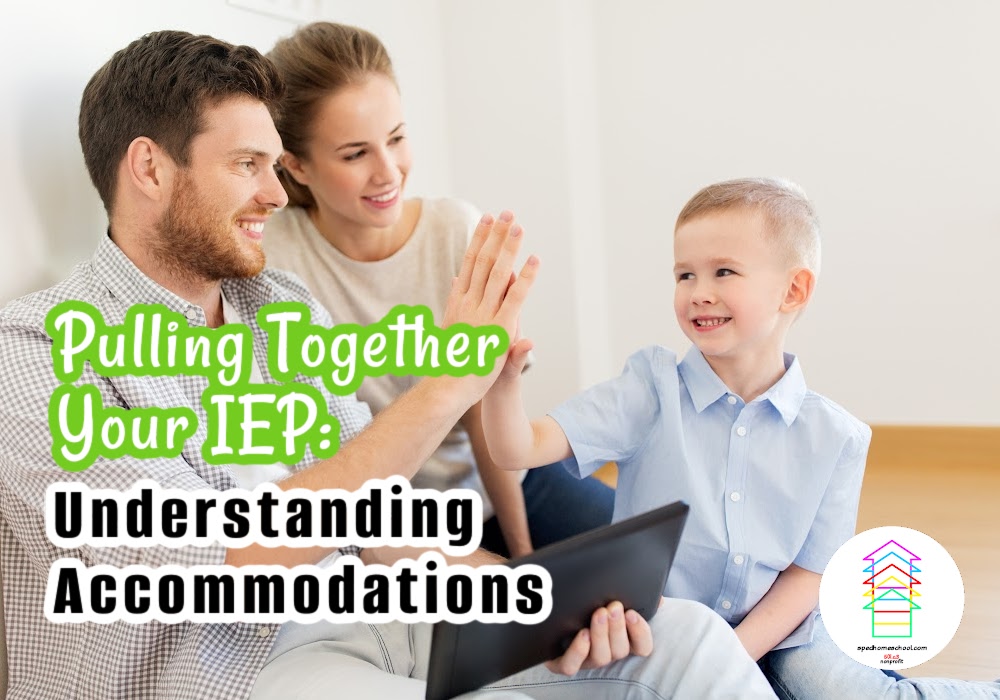
Amy Vickrey, MSE, MEd
Accommodations are a frequently used word when children struggle with academics, but it can be challenging to know what the right accommodations are for each individual child. An accommodation is simply changing the way a child accesses the information they need to learn. Information to consider for determining accommodations should include any annual testing, psycho-educational assessments, therapy assessments, parent observations, performance on schoolwork, behaviors that arise when in a specific situation, i.e., sitting for a long period of time, or during a certain academic subject. Accommodations can address needs that are academic, behavioral, cognitive, or related to executive functioning. Finding the right accommodations might be a process, or you might find one that helps on the first try.
Here are some guiding questions and tips to help:
- What are your child’s strengths? Strengths are tools that can be used, sometimes creatively, to support weaknesses.
- What are your child’s weaknesses? While these need to be worked on, activities and materials should not be so hard that weaknesses make your child frustrated. If your child is struggling, it’s ok to back up to an easier level before moving forward.
- Focus activities on one skill at a time – e.g., if you are working on writing, work on writing. If you are working on spelling, it’s ok to spell out-loud or use letter tiles rather than write words if writing is physically challenging.
- Pair a strength with a weakness – For example, if reading is a challenge, pair a physical book with the audiobook or read the book aloud together.
- Allow your child to verbally respond to questions if writing is frustrating, unless the goal is specifically to write.
- Consider a lesser accommodation first (math chart before calculator, or raised line paper before computer).
- Give yourself permission to skip or change activities that do not work for your child. No curriculum is perfect. Make it fit your child instead of trying to make your child fit the curriculum.
- If your child struggles with reading, it’s ok to read the questions and answer choices to them in any subject! Including reading! This is an allowable accommodation for most standardized tests in schools.
- Ask questions! Ask other parents what has worked for their children in similar situations. They may have an idea you haven’t tried yet.
- Ask your child! Often, children know what is easy and what is hard for them. Sometimes they have creative solutions adults would not think of, or that they think is fun, so they are motivated to try when they would not otherwise.
- Children can learn from videos and educational games, sometimes more than a workbook.
- Some children need to be moving to be learning – make it interactive or allow for movement and creativity in seating arrangements.
- Remember, behavior is communication – if your child’s behavior changes during specific activities, it may be their way of saying “this isn’t working for me.”
- Use as many senses as possible. Even just chewing gum or snacking can sometimes make a difference in the learning process. The more senses are engaged, the more pathways that are built, and the easier your child will remember the information later.
For more information and tips on accommodations, check out these additional resources:
Writing an IEP: Accommodations and Modifications
What are Accommodations and Modifications?
Creative Ways to Homeschool Special Education
Creating a Unique Homeschool Learning Oasis
Whether you need simple accommodations such as reading questions or more creative solutions, thinking through these 14 simple questions and tips can help guide parents to simple ways to accommodate their child. Allowing for weaknesses, and focusing on strengths in each area, will allow your child to accomplish their goals. Supporting weaknesses and reducing frustrations lead to a love of learning, and a love of learning encourages lifelong learning, helping children to become independent adults who can find the answers to questions they don’t know.
Amy Vickrey is the Training Manager at SPED Homeschool. To learn more about her, her background, homeschooling journey, and testing/tutoring services, visit her team member page.

